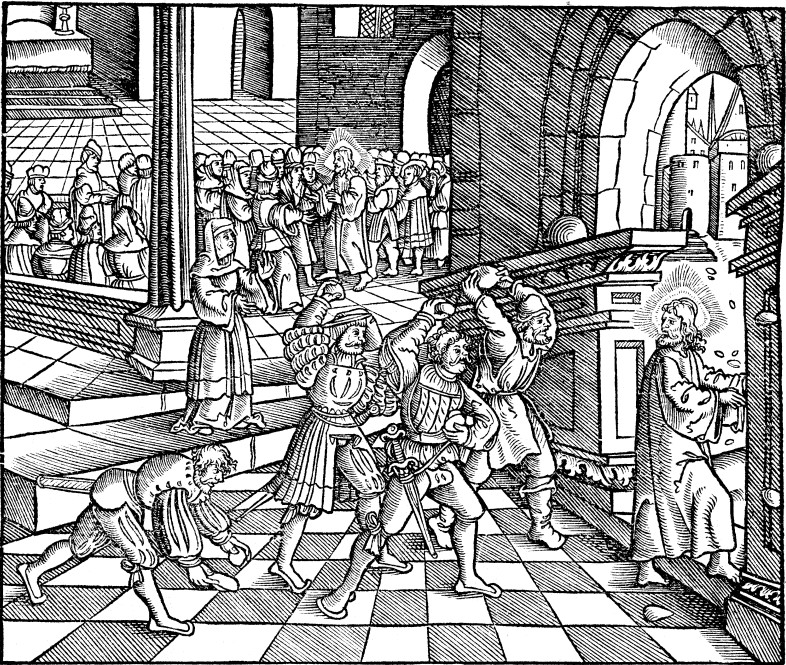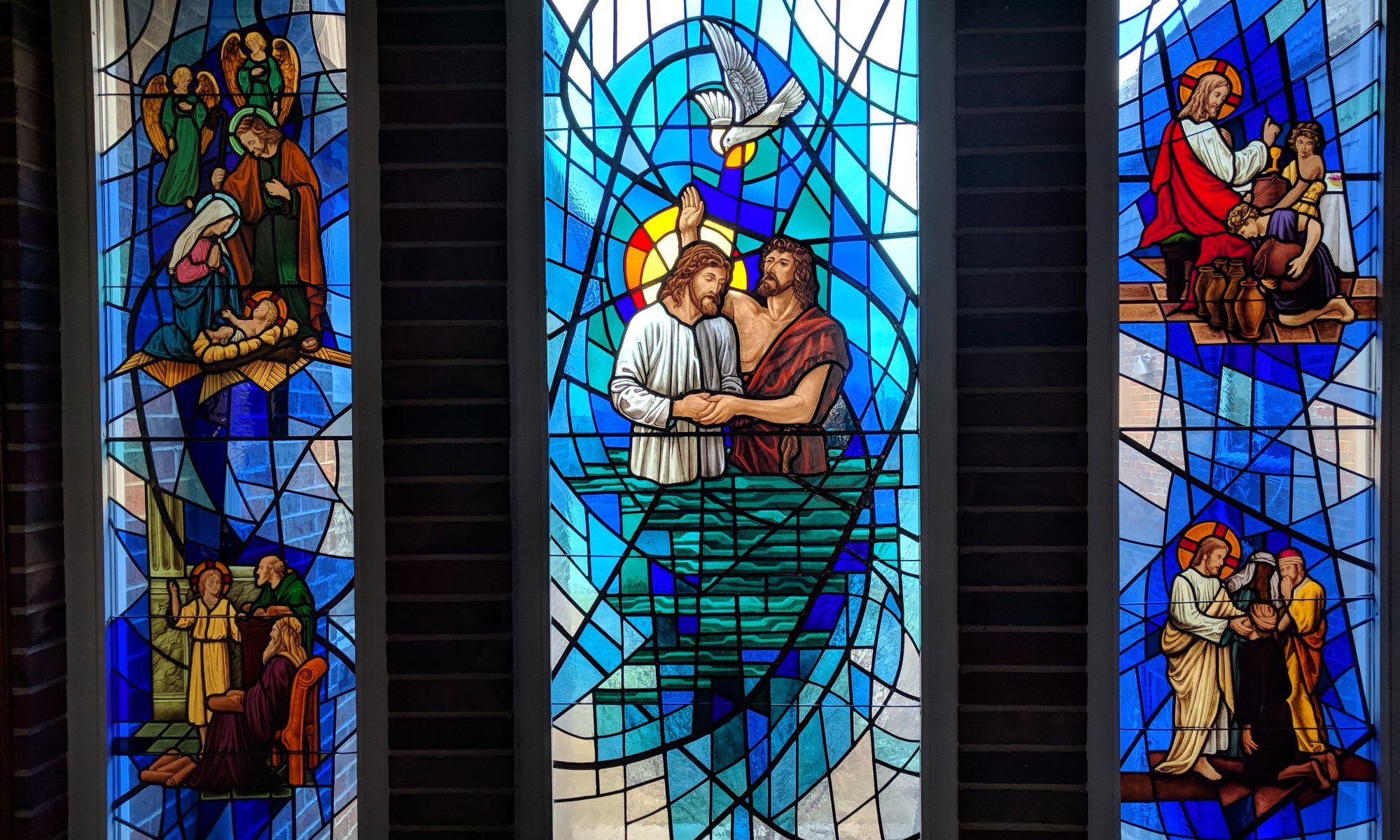
Lessons: Genesis 22:1-14, Hebrews 9:11-15, John 8:46-59
Hymns: LSB 604, 440, 422, 597, 439, 420
Grace, mercy, and peace to you from God our Father and our Lord and Savior, Jesus Christ. Amen.
I find it interesting how long some things are remembered and how quickly other things are forgotten. We all have memories from our childhood, yet there are things we’ve done yesterday that we have already forgotten. We may remember eating a meal years ago and cannot think of the meals we ate just yesterday. Memories in the political landscape are also interesting. Many may remember with fondness certain presidents who served years ago; yet most become quickly dissatisfied with whomever is the current President. The turnout at the last presidential election was at record highs (in part to unseat an unpopular incumbent). Now dissatisfaction with the current president is so high that it looks like the previous president may be elected this November.
God takes an interesting view on memory. He is omniscient, which means He knows everything. He knows what has happened, what is happening, and what will happen. Yet, God declared in Isaiah 43:25, “I, I am he who blots out your transgressions for my own sake, and I will not remember your sins.” And God makes a similar statement in Hebrews 8:12, “I will be merciful toward their iniquities, and I will remember their sins no more.” God—who knows all things—forgives sin and remembers them no more!
The all-knowing God who has numbered the hairs on your head is the same God who forgives your sin and remembers them no more!
That is God’s way with sinners. And, as Christian sinners, our way with fellow sinners is to be the same as God’s way. Instead of saying, “I’ll forgive you, but I won’t forget what you’ve done,” we say, “I will forgive you and forget what you have done. Just as God does not hold your sin against you, so I will not hold your sin against you either.” That is what it means to love your neighbor. Do to them as you would have them do to you.
Another instance of memory is found in our Gospel today when compared to our Gospel from last week. Do you remember what you heard last week? Last week, a crowd came up to Jesus, for they had heard the reports of the miracles He performed. It was a grassy place and there were 5,000 families present. Jesus performed the great miracle of feeding the 5,000 using five barley loaves and two fish. After witnessing this miracle, the people remembered God’s promise in Deuteronomy 18:18. In that passage, God heard their cry for mercy and declared, “I will raise up for them a prophet like you from among their brothers. And I will put my words in his mouth, and he shall speak to them all that I command him.” So, after Jesus miraculously fed the 5,000, the crowd responded, saying, “This is indeed the Prophet who is to come into the world!”
And the crowd was right. Jesus is The Prophet promised by God. God put words in His mouth to speak. Jesus is the One who speaks. The same One who spoke, “Let there be light” while the Father created all things out of nothing has come—of the house and lineage of David. He came to speak. He came as the Word made flesh who tabernacled among us. He came in mercy, to earn salvation for sinners, to serve as the Mediator between God and man, and to reconcile sinners to God.
But do you remember what they tried to do once they realized that Jesus is The Prophet who was promised over 1400 years earlier? They wanted to make Him King. They wanted Jesus to rule over them. They wanted Jesus to free the Promised Land from foreign rule and grant them independence. They wanted to establish their own sovereignty.
And that’s where their memory gets faulty. Yes, Jesus is the Prophet. He’s not only the Prophet, but He’s also Priest and King. As Prophet, He speaks and we listen, as it is written in Hebrews 1:1, “Long ago, at many times and in many ways, God spoke to our fathers by the prophets, but in these last days he has spoken to us by his Son.”
He is the High Priest who offered Himself as the sacrifice to pay for the sins of the entire world. As we heard in our Epistle today, “Christ appeared as a high priest of the good things that have come… He entered once for all into the holy places… by means of His own blood, thus securing and eternal redemption” (Heb. 9:11-12). He is our Substitute, who died in our place, just as the ram died in Isaac’s place.
And Jesus is King. As the victorious Lamb of God who has been raised from the grave and ascended into Heaven, Jesus reigns over His Church on earth—He reigns over His Church in Heaven—and He reigns over the entire universe.
So, in a sense, they were right that Jesus is King. But they were wrong in the kind of king Jesus is. Our Lord’s kingdom was not just a small parcel of land between the Mediterranean Sea and the Jordan River—His kingdom does not involve reigning over just one people group to the detriment and ignorance of all others; His kingdom is over all creation—all the universe.
So that was last week. The people were so impressed by our Lord’s miracle that they wanted Him as their king. That was recorded in John 6. Now today, in John 8, Jesus is speaking to the Jews. In His midst were many who did not believe in Him, yet there were some who did.
In John 6, they came to Jesus to hear His preaching. In John 8, they are angered by His preaching. In John 6, they want Jesus to reign over them, but He escapes. In John 8, they want to stone Jesus to death, and He also escapes.
In John 6, Jesus went to be alone for a short time. In John 8, Jesus hid Himself and went out of the Temple.
It is for this reason we have veiled our crosses and are omitting the Gloria Patri from the Introit and Nunc Dimittis. We are just one week from Holy Week. We have begun our Lord’s Passion. Jesus is going through the stages of His humiliation. He is about to suffer, be crucified, die, and be buried. All to take our sin away. All so that God will forgive our iniquity and remember our sins no more.
So, what happens that causes this abrupt change from John 6 to John 8? Why are they so quick to force Jesus as king and now they are so quick to stone Jesus to death? Don’t they remember what they wanted to do for Him after He fed the 5000?
Remember, as John 6 progresses, Jesus preached that He is the Bread of Life and that those who feed on Him will never die. At these words, many of His followers found His teachings to be too difficult, and they left Him. He continued to preach and teach until we get to our Gospel today. In all of it, they found His teachings to be questionable. They became doubtful that He could be the Prophet, even though Jesus stated that He is. They no longer think He’s the One promised by God.
Because they have now rejected Jesus, Jesus rightly declares that their Father is the Devil, who is a liar. They dismiss Jesus as a demon-possessed Samaritan. Yet Jesus says, “Whoever keeps my Word will never see death.” They are offended by His Words because, they reasoned that if these words are true, Abraham should still be living. How can He make Himself out to be greater than their father Abraham who has died? And how can Abraham rejoice to see Jesus’ day when Abraham lived 2000 years earlier and Jesus isn’t even 50 years old?
At this, Jesus says, “Truly, truly, I say to you, before Abraham was, I AM” (John 8:58).
Now they remember clearly. There’s no question in their minds what Jesus is saying. So, they pick up stones to throw at Jesus. They want Him dead. But He hides Himself and goes out of the Temple.
What was so clear—so vivid—that they now want Him dead? Of course, they were already upset with Jesus for calling them liars and saying they have the Devil as their father. But Jesus said, “Before Abraham was, I AM.” By saying this, Jesus is declaring that He is the I AM who visited Moses (Exodus 3:13-14). Jesus is saying, “I AM Yahweh, the God of the Old Testament.” Jesus is saying, “I AM who I AM—God Himself.”
In the Old Testament, the name for God was I AM. Now Jesus declares that He is the same I AM.
They remember God’s name. They hear Jesus’ claim. They accuse Jesus of blasphemy. They attempt to stone Him.
But Jesus, being God, can hide Himself and get out of the Temple. His hour had not yet come. The time of His Passion is beginning. He is to serve as the world’s great substitute—to take away the sin of the entire world.
You can see a picture of that great substitute in our Old Testament lesson. God tested Abraham’s faith, telling Abraham to take his only son—the son of the Promise—the one who is to carry on the Messianic line and offer him as a sacrifice. Like Jesus, Isaac carried the wood for the sacrifice. Like Jesus, he went up on a mount. Like Jesus, he was laid up on an altar for sacrifice—to shed innocent blood.
But Isaac was not sacrificed. God stops Abraham. And Abraham looks up and sees a ram caught in the thicket by its horns—a substituted provided by God to let Isaac go.
We deserve temporal punishment and eternal death for our sin. But Jesus carried His cross up Mt. Calvary and was offered up as the sacrifice on the altar of the cross in our place. He shed His innocent Blood as our substitute. So, we will not die, but live and shall live in the land of the living. We will be received into God’s eternal kingdom. For the Lamb has been slain. He lives. Our sins are forgiven, and God remembers them no more. Amen.
The peace of God which passes all understanding keep your hearts and minds in Christ Jesus to life everlasting. Amen

